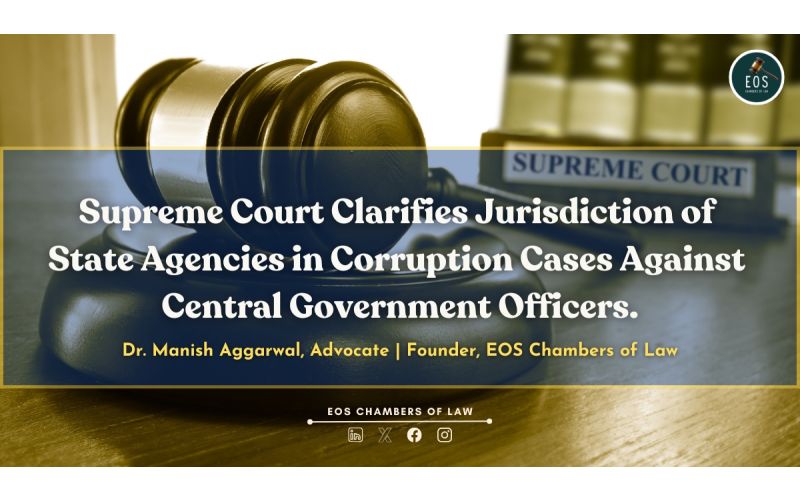Central Civil Service Rules , Retired Employee Can Be Appoin

Central Civil Service Rules , Retired Employee Can Be Appointed As Inquiry Authority In Disciplinary Proceedings…
The Supreme Court recently held that the disciplinary authority under the Central Civil Service Rules is empowered to appoint a retired employee as an inquiry authority. It is not necessary that the inquiry officer should be a public servant.
The Supreme Court bench comprising Justices Sanjiv Khanna and Justice Bela M Trivedi was hearing an appeal against Odisha HC judgment which relied on Ravi Malik v. National Film Development Corporation to hold that a retired public servant could not have been appointed as an inquiry officer.
The Court distinguished it and said it wouldn’t be applicable in the present case. In that case, Rule 23(b) of Service Regulations,1982 of NFDC was applicable which specifically stated that the disciplinary authority may appoint a “public servant” to inquire into the misconduct of an employee. Whereas in this case, Rule 14 of the Central Civil Services, 1965 would apply where disciplinary authority may appoint an “authority” to inquire into the misconduct of a govt employee.
The court held thus “Therefore, the disciplinary authority is empowered to appoint a retired employee as an inquiry authority. It is not necessary that the inquiry officer should be a public servant. Hence, no fault can be found as the inquiry officer was not a public servant, but a retired officer.”
The Court also referred to Union of India v. PC Ramakrishnnaya which made a reference precedent set in The court noted that the Alok Kumar case had made it clear that Rule 9(3) used the word “other authority” and not “public servant” who may conduct an inquiry. It observed, “a retired officer could also be vested with the delegated authority of the disciplinary authority to hold the inquiry.
The Court therefore allowed the appeal and set aside the judgment of HC which had upheld the order passed by the Central Administrative Tribunal, Cuttack bench.
BACKGROUND OF THE CASE
The respondent Jagdish Chandra Sethy had assailed the order of disciplinary authority before Central Administrative Tribunal at Cuttack. He contended that the authority had not recorded specific reasons why a retired government servant was appointed to act as an inquiry officer. The tribunal agreed and passed an order in his favor. Aggrieved by the same, the appellant approached the High Court which, again upheld the order of the tribunal.
Post Categories
Featured Posts
Latest Posts
Latest Posts

No Law Gives Right To Husband To Beat Torture His Wife Delhi High Court...
Synopsis The court was hearing an appeal by a woman challenging the decision of the trial court nbsp whereby it has dismissed her petition seeking divorce from the man on the ground of cruelty and desertion While granting divorce to...

ADR in Family Law Benefits and Challenges...
Alternative Dispute Resolution ADR has become a pivotal tool in family law offering a way to resolve disputes without the need for contentious court battles At Eos Chambers we've observed the growing reliance on ADR methods such as mediation arbitration...

Motor Accident Claims Social Status Of Deceased To Be Considered If There s No...
The Supreme Court has reinstated an award originally granted by the Motor Accidents Claim Tribunal MACT The apex court expressed disappointment over the approach taken by the High Court in evaluating the evidence and reinstated the MACT rsquo s verdict...

Motor Accident Claims No Right To Recovery For Insurer Merely Because Vehicle Owner Didn't...
The Supreme Court on Monday th October held that an insurance company cannot claim that it is not liable to pay compensation in a motor vehicle accident claim just because the vehicle owner did not verify the genuineness of the...

Mediation vs Arbitration Choosing the Right Path in ADR...
Alternative Dispute Resolution ADR has become an increasingly popular method for resolving disputes outside of traditional court litigation Among the various ADR methods mediation and arbitration stand out as two of the most commonly used approaches While both aim to...

Supreme Court Clarifies Jurisdiction of State Agencies in Corruption Cases Again...
The of India has recently delivered a judgment of far-reaching significance in the context of corruption prosecutions involving Central Government employees Although the matter was argued on behalf of the petitioner and the decision ultimately went against us...

Speak With Our
Get a Appointment
















